January 5, 2023
 Dear MPA Community,
Dear MPA Community,
Author John Steinbeck said, “I have come to believe that a great teacher is a great artist and that there are as few as there are any other great artists. Teaching might even be the greatest of the arts since the medium is the human mind and spirit.” I often think about the passion and dedication of MPA teachers as artists. Their creativity, zeal for teaching, and love of students are much the same as artists, and their impact is magnificent and long-lasting.
I’m always nervous when a long-serving teacher makes an appointment with me, fearing they will announce their retirement. Personally, I couldn’t be happier for them. Teaching is an exceptionally demanding profession, and teachers at MPA go above and beyond what is expected. They give so much of themselves, and retirement is certainly well deserved. Professionally, I’m always a little sad about losing a valuable and endearing colleague. MPA is a tight-knit community, and I am fortunate to work alongside some amazing human beings. While I do not doubt their legacy will continue under their successors’ care, I am a bit melancholy.
I want to share with you that three of MPA’s longest-serving faculty members have decided to retire at the end of this school year: visual art teacher Lisa Buck, music teacher Mari Espeland, and librarian Nancy Lage. Combined, they have served the MPA community for 105 years, and for that, we are exceedingly grateful.
 Lisa Buck came to MPA in 1984 as a Middle School visual arts teacher. She co-created the MPA K-12 visual arts curriculum with founding teacher Karen Rossbach. Over time, they honed the program in depth and breadth, and Ms. Buck designed a multilevel ceramics program in the Upper School. She has taught drawing, painting, sculpture, fibers, design, printmaking, and ceramics.
Lisa Buck came to MPA in 1984 as a Middle School visual arts teacher. She co-created the MPA K-12 visual arts curriculum with founding teacher Karen Rossbach. Over time, they honed the program in depth and breadth, and Ms. Buck designed a multilevel ceramics program in the Upper School. She has taught drawing, painting, sculpture, fibers, design, printmaking, and ceramics.
From 1998-2000, Ms. Buck taught overseas at the American School in Casablanca, Morocco, and then returned to MPA. While teaching, she also built her career as a potter. Ms. Buck shares, “It has been a delicate balance of commitment, hard work, and passion. I have longed for a time when I could be full-time in my own studio, and now, that is exactly what I am going to do.”
She adds, “I have given my whole-hearted self to helping students see their beautiful potential as young artists and helped to build an outstanding program.” I am deeply grateful for the vision, creativity, and passion Lisa has brought to MPA over her long service to the school. Students have benefitted from having a gifted art educator and an accomplished working artist in the same person; she will be very missed.
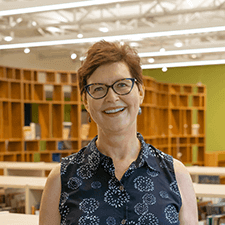 Mari Espeland came to MPA in 1989 and built the Lower School music program upon the Orff Schulwerk approach. She established the Lower School Art and Music Show with Karen Rossbach and incorporated distinctly American music traditions, such as jazz, and world music through drumming.
Mari Espeland came to MPA in 1989 and built the Lower School music program upon the Orff Schulwerk approach. She established the Lower School Art and Music Show with Karen Rossbach and incorporated distinctly American music traditions, such as jazz, and world music through drumming.
Ms. Espeland shares, “This environment has allowed me to grow as a music educator and collaborate with colleagues to benefit students more than I could have ever dreamed possible when I began teaching at MPA in 1989. Music education has been much more than a job or even a career for me. Rather, it has been a calling.”
After 33 years of boundless passion for music and dedicated service to MPA, I have profound respect and deep appreciation for the program she built, the many, many children she has inspired, and the beauty she has brought to their lives and to MPA.
Nancy Lage became MPA’s librarian in 1986 and has served the school for 37 years. She developed the PreK-12 library program and managed an extensive 23,000-volume book collection, 30 academic databases, and a dynamic library website to support a diverse PreK-12 curriculum. She shares, “A joy-filled part of my job at MPA has been matching students and faculty with books and resources that inspire them to think, reflect and grow.” She is well-known for being able to find the perfect next book for readers of all ages.
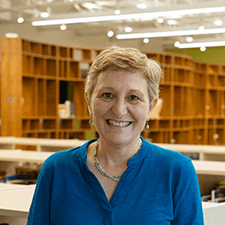 Ms. Lage helped co-create the new Martin Lenz Harrison Library, ensuring that students have access to high-quality literature, the latest technology, and knowledgeable staff who are always willing to help. It opened in 2019 and has become a beloved place on campus. She shares, “The Martin Lenz Harrison Library has secured its position in the heart of the school as a place where everyone in the community feels welcome. My involvement in the co-creative design of this facility has been a labor of love. The creative process was a dream for me and a lovely legacy I leave behind as I retire.”
Ms. Lage helped co-create the new Martin Lenz Harrison Library, ensuring that students have access to high-quality literature, the latest technology, and knowledgeable staff who are always willing to help. It opened in 2019 and has become a beloved place on campus. She shares, “The Martin Lenz Harrison Library has secured its position in the heart of the school as a place where everyone in the community feels welcome. My involvement in the co-creative design of this facility has been a labor of love. The creative process was a dream for me and a lovely legacy I leave behind as I retire.”
Ms. Lage has dedicated her life and career to fostering a joy and love of reading and creating an inviting, warm, and safe space for students to follow their interests and discover their passions. I have the utmost respect and gratitude for her work to ensure MPA students experience the joy and magic of reading.
Great schools depend on great teachers. MPA students have greatly benefitted from the longevity and experience of long-serving teachers. When teachers do leave MPA, it is most often because of life changes or retirement. In the case of Ms. Buck, Ms. Espeland, and Ms. Lage, all three began their MPA career within the first five years of our founding. When teachers leave MPA, it can sometimes feel jarring, but in reality, it is a part of life.
A recent study by the Rand Corporation reported that among all the factors that impact student achievement, the most important is a good teacher. (This is particularly true with math and science, where teachers have as much as two to three times the effect on student achievement.) “The best teacher in the world is someone who loves what he or she does, and just loves it in front of you,” said Fred Rogers. MPA teachers work hard at building personal relationships with students, helping them discover their true selves and their identities. Together, we have created and nurtured a school community grounded in multi-layered relationships and strong connections with one another.
Please join me in showing your appreciation for Ms. Buck, Ms. Espeland, and Ms. Lage by attending the annual Retirement Gathering on Thursday, May 25, at 4 PM in the Martin Lenz Harrison Library. A community invitation will follow in May, but please save the date.
Warm regards,
Dr. Bill Hudson
Head of School
PS: Their positions will be posted on our website soon—please help us find new faculty who will carry on their legacy at MPA.
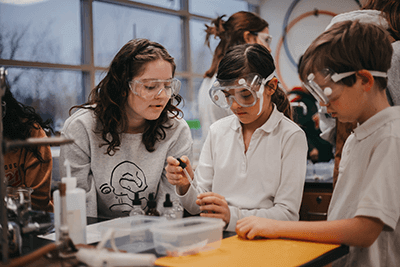 from Bill Hudson, head of school
from Bill Hudson, head of school How long have you taught at MPA?
How long have you taught at MPA?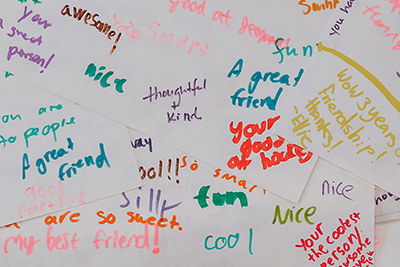 from Bill Hudson, head of school
from Bill Hudson, head of school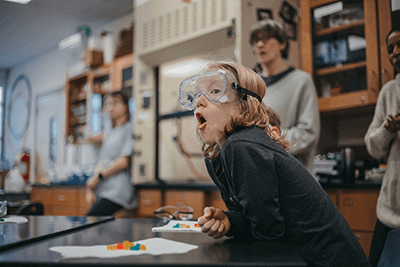 from Ann Jurewicz, Lower School director
from Ann Jurewicz, Lower School director from Bill Hudson, head of school
from Bill Hudson, head of school “Success is no accident. It is hard work, perseverance, learning, studying, sacrifice, and MOST of all, love of what you are doing.” -Pelé
“Success is no accident. It is hard work, perseverance, learning, studying, sacrifice, and MOST of all, love of what you are doing.” -Pelé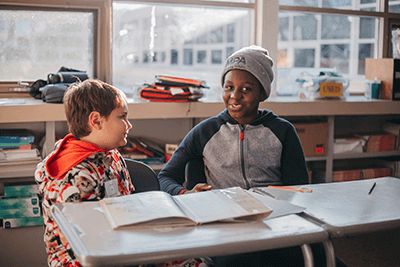 from Dr. Jenn Milam, Middle School director
from Dr. Jenn Milam, Middle School director Dear MPA Community,
Dear MPA Community, Lisa Buck came to MPA in 1984 as a Middle School visual arts teacher. She co-created the MPA K-12 visual arts curriculum with founding teacher Karen Rossbach. Over time, they honed the program in depth and breadth, and Ms. Buck designed a multilevel ceramics program in the Upper School. She has taught drawing, painting, sculpture, fibers, design, printmaking, and ceramics.
Lisa Buck came to MPA in 1984 as a Middle School visual arts teacher. She co-created the MPA K-12 visual arts curriculum with founding teacher Karen Rossbach. Over time, they honed the program in depth and breadth, and Ms. Buck designed a multilevel ceramics program in the Upper School. She has taught drawing, painting, sculpture, fibers, design, printmaking, and ceramics. Mari Espeland came to MPA in 1989 and built the Lower School music program upon the Orff Schulwerk approach. She established the Lower School Art and Music Show with Karen Rossbach and incorporated distinctly American music traditions, such as jazz, and world music through drumming.
Mari Espeland came to MPA in 1989 and built the Lower School music program upon the Orff Schulwerk approach. She established the Lower School Art and Music Show with Karen Rossbach and incorporated distinctly American music traditions, such as jazz, and world music through drumming. Ms. Lage helped co-create the new Martin Lenz Harrison Library, ensuring that students have access to high-quality literature, the latest technology, and knowledgeable staff who are always willing to help. It opened in 2019 and has become a beloved place on campus. She shares, “The Martin Lenz Harrison Library has secured its position in the heart of the school as a place where everyone in the community feels welcome. My involvement in the co-creative design of this facility has been a labor of love. The creative process was a dream for me and a lovely legacy I leave behind as I retire.”
Ms. Lage helped co-create the new Martin Lenz Harrison Library, ensuring that students have access to high-quality literature, the latest technology, and knowledgeable staff who are always willing to help. It opened in 2019 and has become a beloved place on campus. She shares, “The Martin Lenz Harrison Library has secured its position in the heart of the school as a place where everyone in the community feels welcome. My involvement in the co-creative design of this facility has been a labor of love. The creative process was a dream for me and a lovely legacy I leave behind as I retire.” from Bill Hudson, head of school
from Bill Hudson, head of school by Dr. Bill Hudson, head of school
by Dr. Bill Hudson, head of school